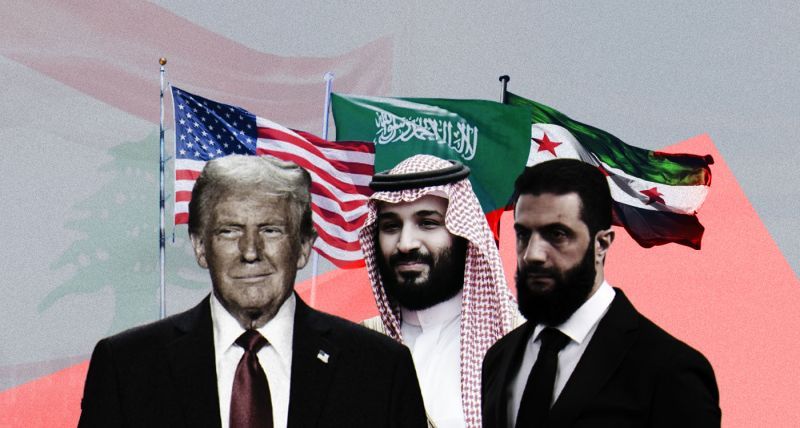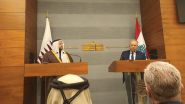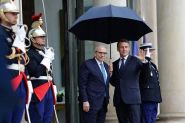
Riyadh, May 2025—In the heart of the Saudi desert, a private summit between US President Donald Trump, Saudi Crown Prince Mohammed bin Salman (MBS) and Syrian President Ahmad el-Chareh reignited crucial conversations on the Middle East’s future. But one absence was consistently noted: that of Lebanon.
While Lebanon’s persistent crises were central to the discussions, its absence spoke volumes. Was this a sign of a country paralyzed by its internal divisions or a reflection of shifting regional priorities?
A Void at the Table… But Not a Diplomatic Snub
Despite speculation, Lebanon's absence wasn’t viewed as a diplomatic snub. Analysts interviewed by This Is Beirut point to improved relations between Lebanon’s president—who selected Riyadh for his first official visit—and Saudi Crown Prince Mohammed bin Salman. This marks a significant shift after years of diplomatic strain during the presidency of Michel Aoun. Lebanese Prime Minister Nawaf Salam also participated in a Ramadan prayer with MBS this past March, a symbolic gesture underscoring their growing ties.
So, why the absence? According to Fares Souhaid, former MP and president of the National Council for Lifting Iran's Occupation of Lebanon, the summit was focused on Syria, specifically the potential lifting of US sanctions on Damascus. This diplomatic initiative, spearheaded by Saudi Arabia, has broken the deadlock between Washington and a post-Assad Syria. Ironically, Lebanon stands to benefit politically, economically and socially from this shift.
The normalization of Syria extends beyond symbolism. By acknowledging the end of the Assad regime and advocating for rapid institutional stabilization, the United States has sent a decisive message, says Fares Souhaid: Syria must be integrated into the regional fold—but only under strict conditions. These include halting military operations toward Israel from southern Syria, enforcing a ban on weapons and restoring control over the borders—measures reportedly accepted by President el-Chareh.
For Lebanon, this shift is crucial. A stable and controlled Syria would significantly curb arms smuggling, armed group infiltration and cross-border instability. Recently, three trucks carrying illegal weapons to Lebanon were intercepted, underscoring the need for accelerated border demarcation. In March, Lebanese Defense Minister Michel Menassa and his Syrian counterpart Murhaf Abu Qasra signed an agreement in Saudi Arabia to delineate the borders to address pressing security and military concerns. This strategic move aims to ensure Lebanon’s military maintains effective control over its territory.
Washington’s Support for Beirut: Action Required
While Syria’s stabilization is essential for Lebanon's recovery, Washington has not forgotten Lebanon. President Trump, speaking from Riyadh, made it clear: the US is ready to support Lebanon, but it expects tangible and immediate actions in return.
Two key issues dominate Western expectations: Lebanon’s monopoly on arms, particularly addressing Hezbollah’s weaponry, and Lebanon's stance on the Abraham Accords. If Beirut wants to regain its regional influence, it must back peace initiatives and make substantial progress on security.
“Despite the election of a new president and government formation, there has been no meaningful political shift,” says journalist and political analyst Ali Hamade. “Reforms remain stalled and Lebanon’s promises to restore state sovereignty, especially concerning Hezbollah’s weapons, are still unresolved.”
Lebanon’s continued inaction is frustrating the international community, especially the United States and its Arab allies, particularly Saudi Arabia. “The pressure is mounting for Lebanon to take decisive action on Hezbollah, which must disarm and become a purely political and civilian entity,” he says. “Until Lebanon regains control over its affairs, any meaningful regional engagement with Beirut will remain out of reach.”
Shaping Lebanon’s Future: From Bystander to Regional Actor
On the ground, discussions are underway about placing heavy and medium weapons under the exclusive control of the Lebanese Armed Forces (LAF), stored in government-run depots. Small arms would also be registered and regulated. The goal is to make the army the sole legitimate military force, in full compliance with UN Resolution 1701—a framework Hezbollah has reportedly agreed to honor, as part of a ceasefire arrangement struck in November 2024, and extended thereafter.
At this critical turning point in regional geopolitics, Lebanon stands at a crossroads. The shifting dynamics between the Arab world and the West, particularly with the United States, offer a historic opportunity. Yet, for Beirut to seize this moment, Lebanon must move from the sidelines to the center of regional affairs, actively shaping its future rather than passively watching the region’s new landscape unfold around it.




Comments